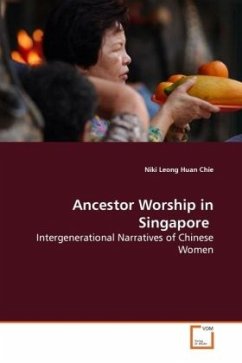It is not uncommon to find the Chinese performing
traditional customs and rites despite the rapid
transformation Singapore society experienced in
recent years. Today, daughters are becoming as valued
as sons and the patriarchal power structure of the traditional Chinese family is beginning to be
challenged. But despite the belief among the Chinese
that religion is considered to be women s business,
it is also widely accepted that women are not allowed
a tablet of either parent and are to worship the
tablet belonging to their husband s family after
marriage. This book will show that this tradition is
but a normative position; the given notions are not
absolutely binding and women do negotiate their
responsibilities. It offers a glimpse of how the
unique biographies, environments and the traditional
values three generations of women were exposed to and
socialized into accepting shaped their experiences
and attitudes towards ancestor worship. This analysis
should be useful to anyone who is interested to learn
more about ancestor worship in contemporary
Singapore, and to those who wish to hear more about
the narratives of the main practitioner herself her
story.
traditional customs and rites despite the rapid
transformation Singapore society experienced in
recent years. Today, daughters are becoming as valued
as sons and the patriarchal power structure of the traditional Chinese family is beginning to be
challenged. But despite the belief among the Chinese
that religion is considered to be women s business,
it is also widely accepted that women are not allowed
a tablet of either parent and are to worship the
tablet belonging to their husband s family after
marriage. This book will show that this tradition is
but a normative position; the given notions are not
absolutely binding and women do negotiate their
responsibilities. It offers a glimpse of how the
unique biographies, environments and the traditional
values three generations of women were exposed to and
socialized into accepting shaped their experiences
and attitudes towards ancestor worship. This analysis
should be useful to anyone who is interested to learn
more about ancestor worship in contemporary
Singapore, and to those who wish to hear more about
the narratives of the main practitioner herself her
story.








